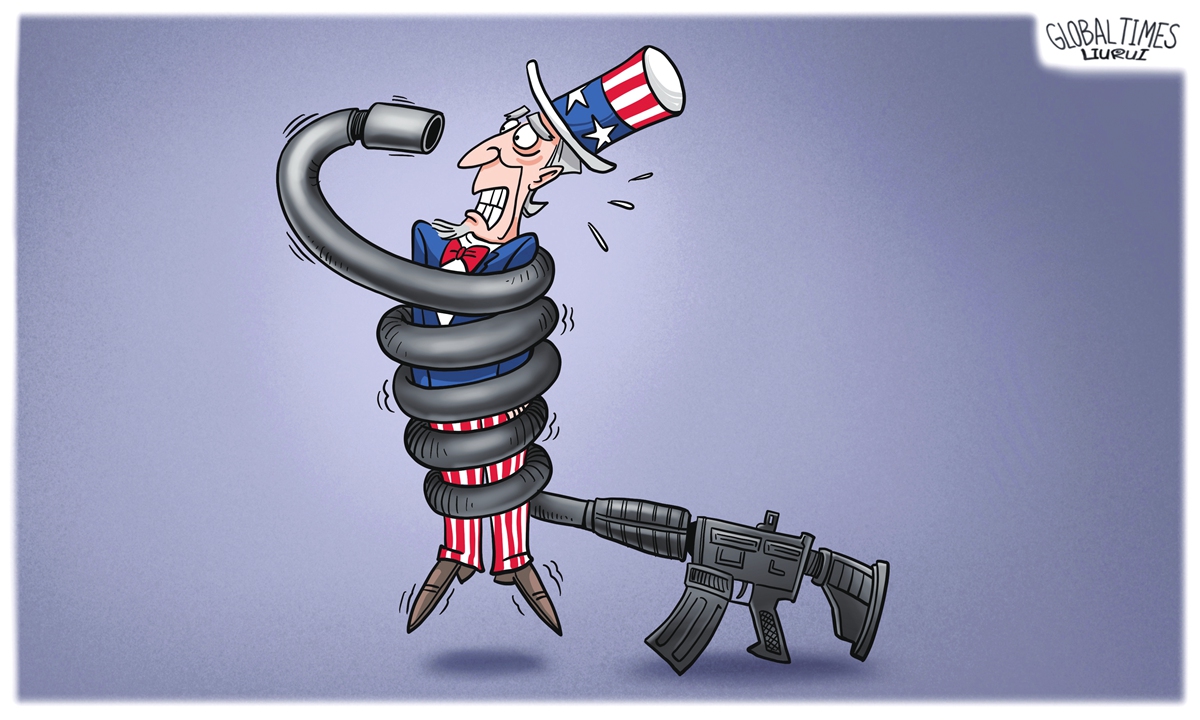
Trapped. Illustration: Liu Rui/GT
The
mk US Supreme Court's recent decision to overturn a ban on certain gun accessories has once again thrust the issue of gun control in the US into the spotlight. This ruling not only sparked outrage among many members of the public but also led people to question the values of the American legal system.
The overturned ban was related to the 2017 Las Vegas shooting, the deadliest mass shooting in US history. The perpetrator fired over 1,000 bullets in just 11 minutes, killing 60 people and injuring more than 850 others.
The reason for such a high number of casualties was that the shooter used a "bump stock," which played a significant role in amplifying the devastation. This accessory can make a semi-automatic rifle's firing rate nearly as fast as a fully automatic rifle, significantly increasing its lethality.
To prevent such tragedies from happening again, then-president Trump signed an executive order banning the possession and sale of these accessories.
However, the conservative-majority Supreme Court overturned this ban. The court reasoned that the US Bureau of Alcohol, Tobacco, Firearms and Explosives exceeded the authority granted by Congress when it issued the ban.
In other words, the Supreme Court did not examine this issue from the perspective of how to protect human life better or ensure public safety; instead, it focused on procedural justice and the balance of power.
This formalistic approach has and will further exacerbate divisions in US society regarding gun control, laying the groundwork for more tragedies in the future. It is tantamount to tacitly encouraging those with murderous intentions to carry out similar large-scale shootings.
According to data released by the Gun Violence Archive website on June 15, there have been over 200 mass shootings in the US so far this year. A mass shooting is defined as an incident where four or more people are injured or killed (excluding the shooter). The data also shows that gun violence incidents have resulted in 7,624 deaths and 14,322 injuries this year, far exceeding the casualties of the Afghanistan War.
According to statistics from the US Department of Defense, a total of 2,461 US military personnel and civilians died during the 20-year-long Afghanistan War from 2001 to 2021.
It is inconceivable that, as one life after another falls victim to gun violence today, US Supreme Court justices can still calmly discuss how to overturn a ban on firearms with massive destructive power. Could they be any more cold-hearted?
Why does the US always struggle to address the life-threatening issue of gun violence? Factors such as the Second Amendment, the separation of powers and the influence of interest groups are intertwined, resulting in inefficient and fragmented decision-making.
However, at its core, the deep-rooted interests of certain groups and individuals in the American legal system make it difficult for the public interest to take precedence over the rights of interest groups and individuals. Under the banner of defending the "freedom to bear arms," the dignity of life seems insignificant and cheap.
The devil is in the details. Upon careful examination of the various details of the US legal system, it is not difficult to find many hidden problems: procedure over substance; a minority hijacks the interests of the majority; the balance of power was reduced to a power struggle.
All of this continues to chip away at the edifice of US democracy.
The decisions by the US Supreme Court, by a margin of six to three, indicate that a majority of justices prioritize procedural justice and checks and balances on rights over substantive justice and humanism.
With the emergence of AI technology, some say it will aid gun control, especially in managing those who may use guns to kill. However, the US needs not just technical improvements but a return to the basics, a re-examination of the connotations of modern concepts of life, liberty, and democracy, and a humanistic approach to substantiate its formalistic rule of law.
If it struggles to address its own significant human rights challenges, how can it have the audacity to claim authority in criticizing human rights situations outside of its borders?

